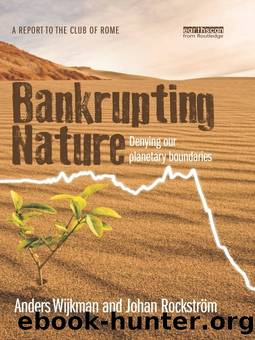Bankrupting Nature by Wijkman Anders;Rockström Johan;Rockström Johan;

Author:Wijkman, Anders;Rockström, Johan;Rockström, Johan;
Language: eng
Format: epub
Publisher: Taylor & Francis Group
Climate resistance: a question of ideology
The Marshall Institute is just one of many organizations in the US which are actively working to deceive and confuse both the public and decision makers on climate change. Another important player is the Heartland Institute, which â just like Seitz â had long played a central role in the campaign to hide the harmful effects of tobacco. Other key players include the American Enterprise Institute, the Competitive Enterprise Institute, the Americans for Prosperity Foundation, the Mercatus Foundation, the Heritage Foundation and the Cato Institute. These institutions are in turn financed by a number of businesses and foundations. What unites these organizations are above all two things. First, they are strong advocates of free enterprise and free markets. Community development and public interest are assumed to be served best by giving self-interest the widest possible scope. And secondly, they actively oppose the IPCC and mainstream climate science findings and refuse to accept the conclusion that human emissions of greenhouse gases could have an impact on the climate.
The more one penetrates the arguments of these organizations, the clearer the picture becomes. The pattern that emerges is of an ideological struggle in which the conservative think tanks see any interference with the activities of companies in the form of taxes, regulations and standards as a fundamental attack on free enterprise and freedom. It considers the whole concept of âsustainable developmentâ as an attempt to put the brakes on progress and thus as a threat to the rights and freedoms of citizens. They continually talk about market solutions. They abhor economic instruments like taxes and fees â or subsidies â and insist on as little political interference as possible. Their motto is thus âThe minimum possible disruption to the economy for the best possible outcomes for the society and its citizens.â
The ideological resistance is often strongly linked to narrow business interests. Energy-intensive businesses annually pump in huge sums to lobby members of Congress. At the same time they also give broad support to various conservative think tanks for their efforts against action on climate change. In 2009 there were more than 2,300 lobbyists registered in the US Congress who had climate change as their principal issue. Often, ideological opposition and specific business interests coincide, as in avoiding CO2 taxes or emissions trading. But the strongest force among climate deniers has ideological overtones: a fervent belief in limited government. Here is where the climate debate differs between the US and Europe. Even in Europe there is considerable opposition to climate policies, but it is essentially rooted in the concerns of many companies about increased costs and loss of competitiveness.
The ideological struggle on the climate issue has also received strong support from the senior physicist Fred Singer, who was one of the driving forces behind the development of satellites to observe the Earthâs surface for environmental and security reasons. Singer was initially involved in environmental issues in a positive way. He wrote articles and books on global environmental issues as early as the 1970s.
Download
This site does not store any files on its server. We only index and link to content provided by other sites. Please contact the content providers to delete copyright contents if any and email us, we'll remove relevant links or contents immediately.
International Integration of the Brazilian Economy by Elias C. Grivoyannis(72808)
The Radium Girls by Kate Moore(11593)
Turbulence by E. J. Noyes(7682)
Nudge - Improving Decisions about Health, Wealth, and Happiness by Thaler Sunstein(7220)
The Black Swan by Nassim Nicholas Taleb(6744)
Rich Dad Poor Dad by Robert T. Kiyosaki(6158)
Pioneering Portfolio Management by David F. Swensen(6057)
Man-made Catastrophes and Risk Information Concealment by Dmitry Chernov & Didier Sornette(5630)
Zero to One by Peter Thiel(5470)
Secrecy World by Jake Bernstein(4369)
Millionaire: The Philanderer, Gambler, and Duelist Who Invented Modern Finance by Janet Gleeson(4071)
The Age of Surveillance Capitalism by Shoshana Zuboff(3968)
Skin in the Game by Nassim Nicholas Taleb(3957)
The Money Culture by Michael Lewis(3822)
Bullshit Jobs by David Graeber(3809)
Skin in the Game: Hidden Asymmetries in Daily Life by Nassim Nicholas Taleb(3714)
The Dhandho Investor by Mohnish Pabrai(3548)
The Wisdom of Finance by Mihir Desai(3513)
Blockchain Basics by Daniel Drescher(3313)
